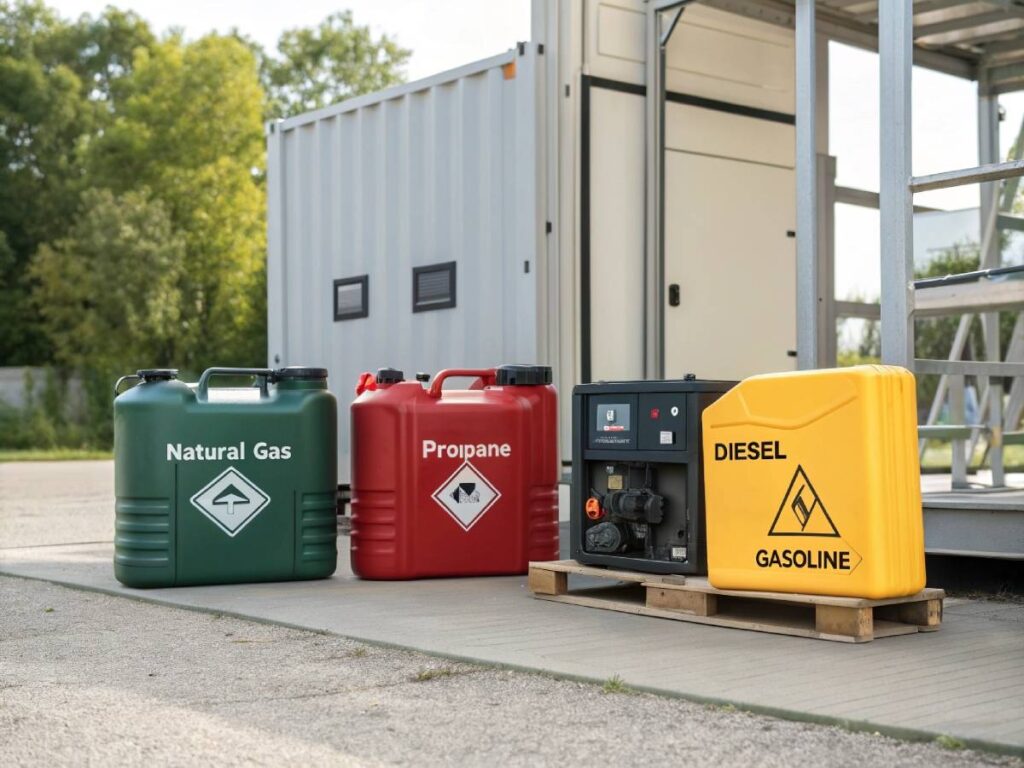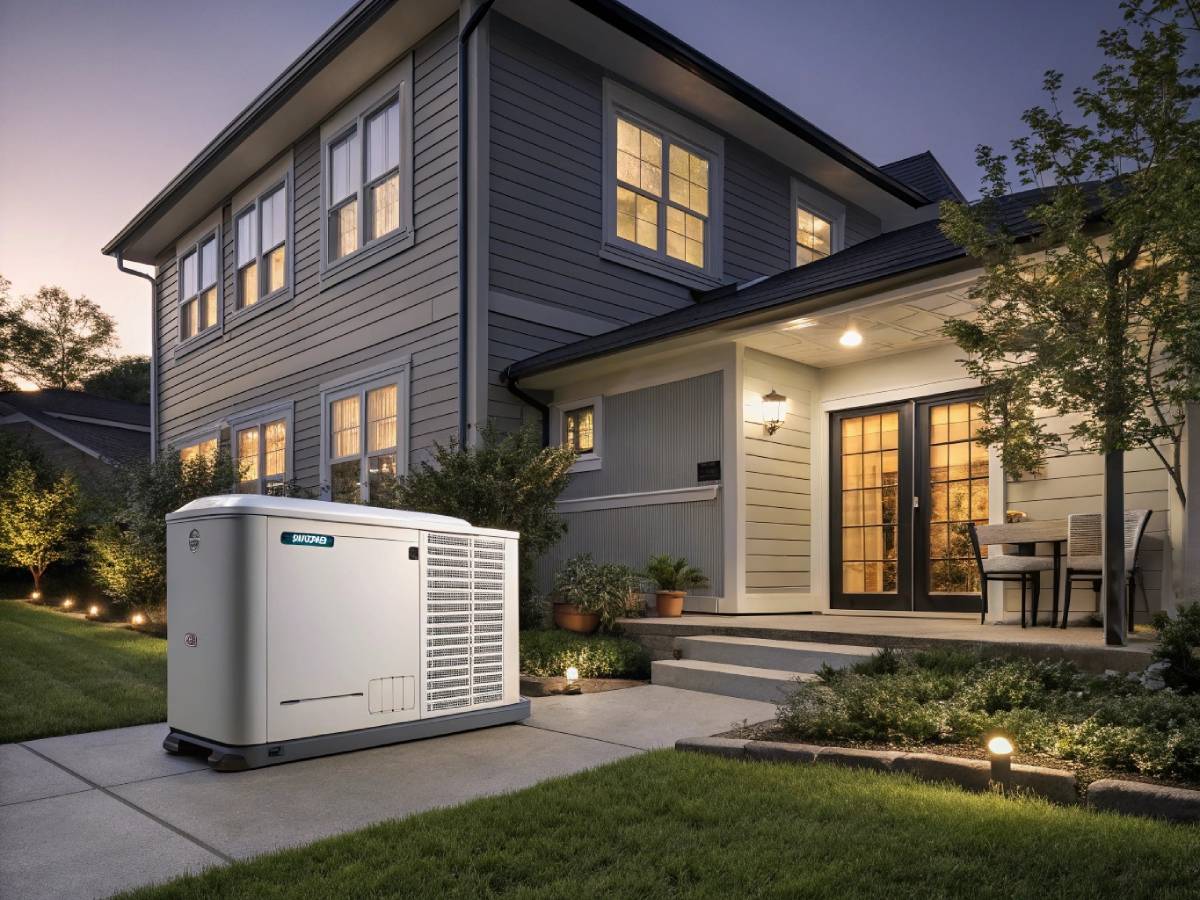Imagine your favorite show reaching its cliffhanger, only to plunge into darkness.
Standby home generators are the unsung heroes that keep your household running seamlessly during unexpected blackouts.
Whether it’s maintaining essential appliances, safeguarding medical devices, or ensuring your home office stays operational, these generators offer peace of mind and uninterrupted comfort.
In areas where power outages are frequent, investing in a fuel-efficient standby generator isn’t just a luxury—it’s a necessity for a resilient and dependable home.
Introducing Standby Home Generators

Why Standby Home Generators Keep the Lights On
Imagine you’re in the middle of binge-watching your favorite show or cooking a delicious family dinner, then boom—the lights go dark. That’s where standby home generators come galloping in to save the day. These power-packed lifesavers keep your home humming along smoothly when the neighborhood’s left in the lurch. Perfect for folks living where blackouts are as common as pizza Fridays, these machines keep essential appliances running. Think about keeping grandma’s medical gear humming, your home office buzzing, and food in the fridge—without breaking a sweat.
Perks of Getting a Standby Home Generator
Having a standby generator is like having a loyal sidekick ready to spring into action when you need it most. Let’s break down how these machines bring their A-game:
- Kickstart Power-Up: Whenever the lights blink off, the generator automatically kicks in. No fiddling around in the dark—it’s business as usual in seconds!
- Power Bliss: It’s like an energy security blanket, wrapping your heating, cooling, lights, fridge, and security setup with cozy, uninterrupted juice.
- Safety Comes First: Ever tried navigating a pitch-dark hallway? Standby generators keep accidents at bay and make sure medical devices aren’t left in the lurch.
- Home Sweet Home Boost: Sprucing up your crib with a generator can up your home’s street cred in more outage-prone neighborhoods, catching any buyer’s eye.
- Chillin’ Vibes: Especially for those using retirement to relax, these generators earn tranquility points by maintaining your creature comforts regardless of what’s happening outside.
For the tech-savvy homeowner, pairing a generator with smart control features lets you boss it around remotely. Check out smart home standby generators for all that good stuff.
Don’t forget to size it right—sizing standby generator for home is the secret sauce. Plus, figuring out the cost analysis and planning for the standby generator installation can take you from probs to happiness in no time.
For more nuggets on why these generators are heroes dressed in steel, pop over to our benefits of standby home generators page. Happy powering!
Understanding Standby Generator Fuel Efficiency
When you’re living on the edge of power outages, knowing how much juice your standby generator can squeeze out of its fuel becomes pretty darn important. This doesn’t just save you cash, but it helps keep the planet a little greener and your generator chugging along longer.
Importance of Fuel Efficiency in Standby Generators
Why all this chatter about fuel efficiency? Here’s the scoop:
- Save Your Wallet: A generator that’s sipping fuel rather than guzzling it helps keep your bills nice and trim.
- More Juice in Your Tank: Stretch that fuel! A savvy generator keeps the lights on longer without needing a fill-up every five minutes.
- Breath of Fresh Air: Cleaner emissions mean you can breathe easy knowing you’re cutting down on pollution.
- Keeps Going, and Going…: Less wear and tear on an efficient machine means it’ll last longer and doesn’t demand as much fixing up.
Need the full lowdown? Check out our complete guide to why your home needs a generator.
Factors Affecting Fuel Efficiency
How do you keep that generator running smooth and efficient? Key things come into play:
| What to Watch | Why It Matters |
|---|---|
| How Much You’re Using It: Keeping it in its sweet spot without overloading keeps things efficient and avoids damage. | |
| Give It Some Love: Regular TLC, like changing the oil and cleaning filters, keeps it purring efficiently. Peek at our handy-dandy maintenance guide. | |
| Type of Fuel: Not all fuel is created equal. Natural gas or propane? They each have their perks and quirks. Get savvy with our piece on fuel types for your generator. | |
| New or Old Model: Flashy new generators usually work better and smarter than grandma’s old clunker. Check out what’s new and hot in top generators for your crib. | |
| Where and When: Sometimes the cold or the height of the hills messes with your generator’s mojo. Make sure it’s set up right for your spot with our cold-weather generator tricks. |
Keep these factors in check, and your standby generator will be a trusty, fuel-efficient companion ready to kick in when you need it most. Wanna know more about setting up and using your generator right? Swing by our page on getting set for standby power.
Types of Fuel for Standby Generators

Picking out the right standby generator can feel a bit like choosing a sidekick for your home. The fuel it runs on makes all the difference, and it can sometimes be like comparing apples to oranges. Let’s break it down and help you figure out the best fit for your situation.
Overview of Available Fuel Options
Your trusty standby generator can sip on a few different kinds of fuel. Each one has its own perks and quirks, so here’s the scoop on what you can pour into these bad boys:
- Natural Gas: This is the top fave for convenience—like having a pizza delivered right to your door.
- Propane: Think of it as the tidy, long-lasting friend with plenty patience.
- Diesel: This one’s the dependable workhorse, reliable as a loyal old pup.
- Gasoline: Always around, like a good neighbor, but doesn’t stick around well for too long.
Key Characteristics of Different Fuel Types
Here’s where each fuel type gets a little like a character in your favorite sitcom, bringing something different to the table. Let’s check out each one below and see what they’re bringing.
| Fuel Type | Efficiency | Availability | Storage Life | Emissions | Cost |
|---|---|---|---|---|---|
| Natural Gas | High | Loads of it | Always there | Low | Middle of the road |
| Propane | Moderate | Plenty | Lasts ages | Low | Can be pricey |
| Diesel | High | Not too bad | Pretty good | More than some | Not too cheap, not too expensive |
| Gasoline | Moderate | Everywhere | Short | Higher | Low |
Natural Gas: Like having an always-on tap in your backyard, natural gas keeps your generator going without breaking a sweat. Its neat burning means there’s less gunk in the air, but check if you’ve got those pipes running by your place.
Propane: This one’s something of a neat freak. Propane keeps things clean and tidy, burning smart with a long storage. Tanks are like water bottles you can top up whenever they’re running low, but the price might give you pause.
Diesel: Diesel pumps out awesome execuity and can endure like nobody’s business. It stores well but needs some looking after or it can go bad on you. Watch the emissions, they’re a bit chunkier compared to the other options.
Gasoline: The old faithful, gasoline is always right there waiting. However, it’s not known for sticking around. Store it too long, and it’ll go stale, and those emissions can start to leave their mark.
Getting cozy with these fuel types will help you make the best call for your generator. If you need more juicy details on picking the right one, check out our standby home generators guide. And remember, a little TLC with standby generator maintenance tips can keep your generator purring smoothly when you need it.
Enhancing Fuel Efficiency
If you’re tired of seeing fuel disappear faster than socks in the laundry, then it’s time to jazz up the efficiency of your standby home generator. A bit of love, care, and maybe a shiny new model can keep your generator churning power without burning a hole in your wallet.
Regular Maintenance Practices
Like a car, your standby generator craves a little TLC to stay in tip-top shape. Routine check-ups help dodge those nasty fuel-guzzling gremlins. Here’s how to keep things running smooth as butter:
- Routine Peek-Under-The-Hood: Have a look-see for leaks, rust, or signs your generator might be crying for help. Fix these hiccups quick to avoid big headaches.
- Oil and Filters Are Your Friends: Changing oil and filters regularly keeps your engine purring. Clean stuff equals better burning of fuel—less money down the gas tank.
- Spark Plug Spa Day: Give your spark plugs a good clean now and then. It keeps the engine in the mood for ignition, cutting down how thirsty it gets.
- Battery Check-Up: Test that battery! A dud one makes the generator work twice as hard, guzzling more gas for the same power.
Here’s a quick cheat sheet for keeping things in shape:
| Maintenance Task | How Often |
|---|---|
| Routine Peek-Under-The-Hood | Every 3 months |
| Oil and Filters Changes | Every 100 hours |
| Spark Plug Spa | Every 200 hours |
| Battery Check-Up | Every 6 months |
For more friendly advice that makes maintenance a breeze, have a gander at our standby generator maintenance tips.
Upgrading to Energy-Upholders
Sometimes a new toy is just the trick. Today’s snazzy generator models cut down on fuel bills more than ever before. Here’s what to look out for when thinking upgrade:
- Inverter Magic: Inverter generators whip up a cleaner energy brew and tweak engine speed to only sip the fuel they need.
- Variable Vibes: These guys adjust their power output based on what you’re demanding—think less juice when you’re just running a few lights.
- Eco Groove: Hit the eco-mode switch, and your generator becomes a super smart shopper, conserving fuel better than a coupon clipper.
| Feature | Why It Helps Save Gas |
|---|---|
| Inverter Magic | Only uses needed juice |
| Variable Vibes | Keeps up with you |
| Eco Groove | Boosts fuel smarts |
Giving your generator an upgrade makeover does more than just save fuel—it’s like giving it superpowers of performance and reliability. Curious about the best in the biz? Scope out our best standby generators for home.
By blending routine care with the fabulousness of modern, efficient models, you’ll keep your generator humming reliably and cash-friendly. So go ahead—fire up that power, sip that fuel slow, and keep your eyes on your budget.
Eco-Friendly Fuel Options
Tired of high fuel bills and wanting to do something good for the planet while you’re at it? Switching to greener fuels for your standby generator could be just the trick. These eco-friendly alternatives not only help cut down on carbon emissions but also make sure you’re covered when the lights go out.
Exploring Renewable Fuel Sources
More people are eyeing renewable fuel options for their home generators these days. First up, we’ve got biofuel, a cleaner-burning alternative made from stuff like vegetable oils or animal fats. It’s eco-friendly and reduces our dependence on finite resources.
And let’s not forget biogas. This wonder fuel is produced from rotting organic materials. It can be collected from places like landfills or farms. Biogas is pretty versatile, too, powering up electricity and heat while slashing greenhouse gases.
Then, there’s hydrogen, which is starting to show up in the clean fuel scene. No nasty emissions here, just plain old water vapor. It’s a game-changer waiting to happen in making standby generators more efficient.
For those all jazzed up to dive into renewable energy, head over to our standby home generators guide for all the juicy details on getting started.
Environmental Impact of Different Fuels
When picking fuels for your generator, it’s good to know how they stack up against Mother Nature. Check out this quick rundown on how some standard and green choices affect the environment:
| Fuel Type | CO2 Emissions (g/kWh) | Renewable? | Other Environmental Aspects |
|---|---|---|---|
| Diesel | ~250 | Nope | Lots of particulates |
| Natural Gas | ~180 | Nope | Less CO2 but watch for methane leaks |
| Propane | ~150 | Nope | Better than some, but still non-renewable |
| Biofuel | ~90 | Yep | Lower CO2 and particulates |
| Biogas | ~50 | Yep | Turns waste into energy |
| Hydrogen | 0 | Yep | Just leaves water vapor behind |
Diesel and natural gas have been staple fuels for backup power, but the trade-off is high CO2 emissions and pollution. Propane burns a little cleaner but still falls short on renewability. Want a deeper dive into how natural gas stacks up to propane? Check out our piece on natural gas vs propane standby generators.
With biofuels and biogas, emissions drop significantly, plus they’re renewable. Then there’s hydrogen, boasting zero emissions, though it’s not quite mainstream in home setups just yet.
Switching up your standby generator fuel to these renewable options is like getting a high-five from Mother Earth. It’s a win for eco-values and fuel efficiency. For more about greening up your backup power, see our feature on eco-friendly standby generators. Taking action with renewable energy isn’t just about cleaner air; it’s about securing a brighter future while staying ready for those pesky blackouts.
Smart Technology Integration
With smart tech busting into households, folks are changing how they handle generators, mainly by making them fuel-efficient. Adding smart bits helps folks keep an eye on fuel levels and steer their generators from afar, ensuring nothing goes haywire.
Smart Features for Monitoring Fuel Efficiency
Today’s savvy generators come packed with gadgets that let you see how they’re sipping fuel. This know-how lets you tweak performance while saving on gas.
| Smart Feature | Description | Benefits |
|---|---|---|
| Digital Fuel Gauges | Shows current fuel status | No surprise run-outs |
| Efficiency Reports | Tracks fuel glugging patterns | Better planning for refills |
| Alerts & Notifications | Prompts for low fuel or needed fixes | Stops downtime, keeps things running smooth |
These clever systems make the whole energy game more hands-on and efficient. With real-time data, folks can be sure they’re getting the most from every drop of fuel. Want some tricks to keep your generator in tip-top shape? Check out our standby generator maintenance tips.
Remote Monitoring and Control Options
One of the big wins with smart tech? Tinkering with your generator without needing to stand next to it. It’s a dream come true for anyone who needs to watch over their gear but can’t always be at home.
| Remote Control Option | Description | Benefits |
|---|---|---|
| Mobile Apps | Manage the generator from your pocket | Take charge from wherever you are |
| Web Dashboards | See generator stats online | Dig into detailed data and past trends |
| Voice Assistants | Hook up with home tech to control with your voice | No hands needed! |
These handy tools keep homeowners in the loop about their generator’s condition. Through mobile apps and dashboards, you can check on things like fuel levels and engine health no matter where you’re chilling. Plus, voice helpers let you run the show without lifting a finger.
Adding smart tech to standby generators doesn’t just beef up fuel efficiency—it cranks up the whole user vibe. Curious about picking the right generator? Swing by our smart home standby generators guide for the lowdown.
Budgeting for Fuel Costs
Keeping the lights on with a standby generator means more than just having a backup—it’s about smart spending, especially on fuel. Here’s how you can keep those dollars in check while ensuring your home stays powered up when it counts.
Factors Influencing Fuel Costs
Fuel expenses for running a generator aren’t set in stone. They dance around a handful of key factors that every savvy homeowner should keep a close eye on:
| Factor | Description |
|---|---|
| Fuel Type | Whether you choose natural gas, propane, or diesel, prices play by their own rules. |
| Fuel Price Fluctuations | Prices are as unpredictable as the weather—affected by the markets and seasons. |
| Generator Size and Load | Bigger machines or more demand equals a bigger appetite for fuel. If you’re new to this, check out sizing standby generator for home. |
| Frequency of Use | If you’re cranking it up often, expect your fuel bill to go up too. Think about how often the power leaves you in the dark. |
| Efficiency of Generator | Upgrade to newer models and watch the fuel costs drop. A peek at smart home standby generators might just save you some cash. |
| Maintenance Practices | Neglect it, and it’ll guzzle down more fuel. Follow these standby generator maintenance tips to avoid extra charges. |
Tips for Managing Fuel Spending
Managing those fuel expenses doesn’t have to be a head-scratcher. A few wise moves can keep your wallet happy and your generator purring like a kitten:
- Regular Maintenance: Keep your generator in tip-top shape to curb extra fuel burning. Our standby generator maintenance tips are lifesavers when it comes to savings.
- Choosing the Right Fuel: Not all fuels were created equal. They come with their cost and efficiency tags. Dive into natural gas vs propane standby generators to pick your poison carefully.
- Smart Use of Load: When the power’s out, stick to using the must-have appliances only. For more know-how, see standby generators for beginners.
- Energy-Efficient Models: Investing in an efficient generator can cut fuel costs like nobody’s business. Get the lowdown on the best standby generators for home for a model that fits.
- Monitor Fuel Prices: Become a fuel price whisperer—buy in bulk when prices hit the floor.
- Safety and Storage: Store your fuel right to avoid waste and headaches. Our standby generator safety tips will keep you in the know.
With a grip on what drives fuel costs and some tricks up your sleeve, you can keep your home’s generator purring happily and affordably. For even more nifty insights, don’t miss our standby home generators guide.
Tips for Making Your Fuel Last
Running your home generator smartly can really save you some bucks and is way better for the planet. Here’s the scoop on keeping your generator running smooth and efficient.
Keeping Your Fuel Fresh
How you store your fuel can make a big difference in how your generator works. Pay attention to these tips to make sure your fuel stays top-notch:
- Good, Clean Fuel Is King: Use only high-quality fuel that fits your generator. Bad fuel can mess things up and slow your generator.
- Right Containers Matter: Store your fuel in containers meant for the job to keep the junk out and the fuel nice.
- Cool and Dry Wins: Keep that fuel in a place that’s cool and dry to stop it from going bad. Big swings in temperature can ruin your fuel.
- Fuel Stabilizers Are Your Friend: Planning on storing fuel for a while? A stabilizer can stop it from breaking down.
- First Come, First Served: Use older fuel first to make sure nothing goes stale.
- Rotate the Inventory: Change out old fuel regularly so you’re always using the good stuff.
Wanna know more about keeping your generator in shape? Check out our generator maintenance guide.
Smart Tips for Using Your Generator
To get the most out of your standby generator, here’s some handy advice:
- Stick to a Maintenance Schedule: Keep up with checks and maintenance like oil levels, filters, and making sure all parts are working well. For detailed advice, give our generator maintenance guide a look.
- Don’t Push It: Running your generator non-stop at full power isn’t a great idea. Use it wisely and only for what you really need.
- Keep an Eye On Fuel Use: Features that monitor fuel intake can help you make tweaks for better efficiency.
- Fine-tune the Settings: Adjust the generator’s settings like voltage and frequency according to your requirements.
- Consider an Upgrade: Newer generators are often more efficient. If it’s been a while, maybe look into a newer model. Check out our take on eco-friendly generators for more.
| What to Do | Why It’s Good |
|---|---|
| Regular Check-Ups | Keeps it running at its best |
| Clean Fuel All the Way | Stops clogs and the slowdown |
| Balanced Usage | Keeps the fuel going longer |
| Fuel Monitors | Helps you save more fuel |
| Smart Storage | Keeps fuel ready to go |
Follow these tips to keep your generator working well and to make the most outta your fuel. For more about why having a home generator rocks, take a peek at our generator benefits article.
Conclusion
Standby home generators are indispensable for maintaining the comfort and safety of your household during power outages. By understanding and optimizing fuel efficiency, homeowners can enjoy uninterrupted power while saving on costs and minimizing environmental impact.
From selecting the right fuel type to integrating smart technology and committing to regular maintenance, each aspect plays a crucial role in ensuring your generator operates at peak performance. Embracing eco-friendly fuel options not only benefits your wallet but also contributes to a greener planet.
Additionally, budgeting effectively for fuel costs and utilizing energy-efficient models can further enhance your generator’s reliability and sustainability. As technology advances, the integration of smart features continues to revolutionize how we manage and interact with our backup power systems.
Ultimately, investing in a fuel-efficient standby generator is a proactive step towards a resilient home, offering peace of mind and continuous power no matter the circumstances. Equip your home with the right generator, follow best practices, and enjoy the seamless blend of convenience and efficiency that keeps your life running smoothly.
Final Thoughts
Investing in a fuel-efficient standby generator is more than just preparing for power outages—it’s a commitment to maintaining your home’s comfort, safety, and functionality no matter the circumstances. By understanding the various fuel options, embracing smart technologies, and adhering to regular maintenance schedules, you can ensure your generator operates efficiently and sustainably.
Moreover, exploring eco-friendly fuel alternatives not only reduces your environmental footprint but also enhances the long-term viability of your backup power system. As technology continues to evolve, the integration of advanced features will make managing your generator even more convenient and effective.
Ultimately, a well-chosen and maintained standby generator provides invaluable peace of mind, safeguarding your household against unexpected power disruptions. Embrace the power of efficiency and reliability, and empower your home to stay lit, cool, and secure through any blackout.
Main Tips
- Choose the Right Fuel: Select a fuel type that balances cost, availability, and environmental impact for your standby generator.
- Regular Maintenance: Schedule routine checks and upkeep to ensure optimal performance and fuel efficiency.
- Integrate Smart Technology: Utilize smart controls and monitoring systems to manage fuel usage effectively.
- Opt for Energy-Efficient Models: Invest in modern generators that offer better fuel economy and lower emissions.
- Store Fuel Properly: Keep your fuel stored in clean, appropriate containers and in a cool, dry place to maintain quality.
FAQs
What is a standby home generator?
A standby home generator is a backup power system that automatically activates during a power outage to keep essential appliances and systems running smoothly.
How does fuel efficiency impact generator performance?
Fuel-efficient generators consume less fuel, reducing operational costs and extending runtime while minimizing environmental impact.
What types of fuel can standby generators use?
Standby generators can operate on natural gas, propane, diesel, gasoline, biofuel, biogas, and hydrogen, each with its own benefits and considerations.
How often should I maintain my standby generator?
Regular maintenance is essential; typically, routine checks should be performed every 3 months, with oil and filter changes every 100 hours of use.
Can smart technology improve my generator’s efficiency?
Yes, integrating smart technology allows for remote monitoring and control, optimizing fuel usage and ensuring the generator operates efficiently.
Recommended Products and Accessories
- Generac Guardian Series Standby Generators
- Reliable power solutions with smart technology integration.
- Generac Guardian Series
- Kohler 20RESCL-200SELS Standby Generator
- High-efficiency generator with low emissions and robust performance.
- Kohler 20RESCL-200SELS
- Cummins Quiet Connect Series
- Whisper-quiet operation with superior fuel efficiency.
- Cummins Quiet Connect
- APC Smart-UPS Battery Backup
- Ensures uninterrupted power for sensitive home electronics.
- APC Smart-UPS
- ProMariner Propane Generator Fuel Tank
- Reliable and safe fuel storage solution for propane-powered generators.
- ProMariner Fuel Tank
- Generator Monitoring System by Sense
- Advanced monitoring system for real-time fuel and performance tracking.
- Sense Generator Monitor
- EcoFlow Portable Power Station
- Portable and eco-friendly power solution for backup and emergencies.
- EcoFlow Power Station
- Champion Power Equipment Portable Generator
- Versatile and fuel-efficient generator suitable for various home needs.
- Champion Portable Generator
- Liquefied Petroleum Gas (LPG) Storage Tank
- Safe storage option for propane and other LPG fuels.
- LPG Storage Tank
- Generator Transfer Switch Kit
- Essential for safely connecting your generator to your home’s electrical system.
- Transfer Switch Kit




















